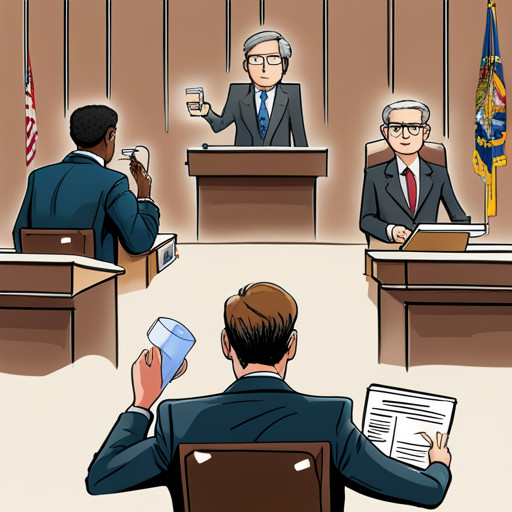Powerful Evidence and Expert Guidance: Building Your Personal Injury Claim
Navigating the intricacies of a personal injury claim can be daunting. This comprehensive guide aims to simplify the process by exploring crucial documentation, evidence gathering, and loss quantification. It emphasizes the importance of systematic organization and expert legal representation in building a strong claim. Whether dealing with car accidents or medical malpractice, this article serves as an invaluable resource for individuals seeking justice, providing the tools needed to approach personal injury claims with confidence and clarity.

Key Takeaways
- Gathering and organizing all required documents is crucial for building a strong personal injury claim, including police reports, witness statements, victim/client statements, and medical reports.
- Supporting evidence such as video or photography, private investigation reports, service history, 911 dispatch calls, and audio recordings can significantly strengthen a personal injury claim.
- Proving loss in a personal injury claim requires documentation such as W2 forms, statements from employers, receipts for medical care and supplies, and documentation of expenses related to rental vehicles or alternate transportation.
- Finding the right attorney for a personal injury claim involves searching directories, accessing guides on choosing an attorney, and considering different types of attorneys based on their expertise in specific areas such as car accidents, defective products, medical malpractice, wrongful death, or workers' compensation.
Understanding the Basics of Personal Injury Claims
Regularly, it is essential to familiarize oneself with the basics of personal injury claims, which involves understanding the necessary documents, supporting evidence, ways to prove loss, and the process of finding competent legal representation. A pivotal part of this process is the importance of medical records. These documents provide concrete evidence of injuries sustained and treatment received, playing a critical role in validating your claim. Navigating the claims process can be complex, but by meticulously organizing your supporting evidence, including medical records, you can strengthen your claim. Furthermore, securing competent legal representation can assist in the correct interpretation of these records and ensure an accurate presentation of your case, thus facilitating a smoother navigation through the claims process.
The Role of Documentation in Personal Injury Claims
In the realm of personal injury claims, proper documentation serves as a solid cornerstone for building a credible and compelling case, and it is through comprehensive and accurate record-keeping that claimants can substantiate their assertions of injury, loss, and liability. The importance of thorough documentation cannot be overstated, as it provides tangible, objective evidence to support the claimant's narrative of events, thereby enhancing their credibility and the overall strength of their case. Moreover, the impact of documentation on claim outcomes is profound. When presented in a systematic and coherent manner, well-documented evidence can significantly influence the adjudication process, helping to tilt the scales of justice in the claimant's favor. Hence, documentation is not just essential, but instrumental in the successful prosecution of personal injury claims.
Gathering and Analyzing Supporting Evidence
While gathering and analyzing supporting evidence for a personal injury claim, it is crucial to meticulously assess each piece of information for its relevance and reliability, and simultaneously coordinate with legal experts to ensure that every document substantiates the claim effectively. The advent of technology has streamlined this process, allowing for efficient and accurate collection of evidence. For instance, utilizing technology in evidence gathering, such as digital photography or security footage, can provide indisputable proof of the incident. Equally significant is the importance of witness testimony, as it offers a human perspective that can validate the victim's account. It is therefore essential to harness both technological resources and human input in building a robust personal injury claim.
Establishing and Quantifying Loss
Establishing and quantifying loss in a personal injury claim necessitates rigorous documentation, including providing evidence of medical expenses and showcasing the impact of lost wages on the claimant's quality of life. This process, often intricate and complex, demands meticulous attention to detail. Accurate calculation of damages is paramount, ensuring a fair and equitable resolution. Key elements include tangible costs such as medical bills, property damage, and lost income. Intangible damages, including pain and suffering, emotional distress, and loss of enjoyment of life, also need to be recognized. A comprehensive understanding of these aspects is crucial in substantiating the monetary value of a claim. Therefore, establishing loss is not merely a procedure, but a strategic approach to uphold justice for victims of personal injury.
Systematic Approach to Document Organization
We are now transitioning to the topic of a systematic approach to document organization, and it's worth noting that this process, although tedious, is critical for maintaining a well-structured and efficient personal injury claim. Proper document organization can play a vital role in maximizing compensation. The more thoroughly and systematically you can present your evidence, the stronger your case becomes. Here are some tips for organizing evidence: start with a dedicated physical and digital space for all relevant items. Use a spreadsheet or master list to keep track of what you have and what you need. Remember, every document, every piece of evidence, contributes to building a compelling case. A methodical approach to organization not only streamlines the process but also increases the potential for maximum compensation.
The Importance of Legal Representation in Personal Injury Claims
Navigating the complex legal landscape of personal injury claims, and securing a fair and just settlement, often necessitates the guidance of an experienced attorney. The value of legal representation during this taxing process is immeasurable. Attorney can provide expert guidance, helping you navigate the intricate legal procedures, and ensuring that your rights are protected. They are adept at building robust cases, meticulously documenting evidence, and advocating for maximum compensation. The impact of expert guidance becomes evident when navigating negotiation hurdles, interpreting complex laws, or standing firm in the face of insurance companies. Thus, securing legal representation is not merely a beneficial step, but a critical one in asserting your rights and achieving the justice you deserve in personal injury claims.
How to Find the Right Personal Injury Attorney
After meticulously documenting your personal injury evidence, the next critical step involves searching for and selecting an experienced attorney who not only specializes in personal injury law but also aligns with your specific needs and expectations. The process of choosing an attorney can seem daunting, but it's crucial to your claim's success. An attorney's experience, track record, and understanding of your unique situation are key factors to consider. Equally important is understanding attorney fees, as this impacts your financial outcome. Many personal injury attorneys work on a contingency basis, meaning they collect a percentage of your settlement or court award. You should clarify this aspect during initial consultations. Selecting the right attorney can significantly influence the trajectory and end result of your case, making this decision critical to your personal injury claim.
Different Types of Personal Injury Claims and Specific Considerations
Interestingly, personal injury claims can vary significantly in nature and requisite considerations, ranging from car accident claims, defective product cases, to medical malpractice and wrongful death lawsuits, each demanding a distinct approach and specialized legal expertise. Understanding the different types of personal injury claims is critical in effectively navigating this complex legal landscape. Specific considerations such as evidence collection, witness statements, and medical documentation, are vital to substantiate the claim. Common mistakes to avoid in personal injury claims include hasty settlements and underestimating future medical costs. Therefore, arming oneself with proper knowledge and tips for negotiating a settlement in a personal injury claim, like retaining a proficient attorney and proper documentation, can greatly enhance the prospects of a favorable outcome.
The Process of Building a Strong Personal Injury Claim
Building a robust personal injury claim involves meticulous gathering and organization of evidence, and often requires expert legal guidance to navigate the complexities of the process. Essential strategies for negotiating a personal injury settlement incorporate comprehensive research, thorough documentation, and persuasive presentation. Ensuring all relevant documents are methodically collected and filed, from medical reports to witness statements, strengthens your claim substantially. A common mistake to avoid when filing a personal injury claim is underestimating the importance of every piece of evidence, even seemingly insignificant ones. Furthermore, neglecting to engage a skilled attorney can limit your settlement potential. Experienced legal counsel can help you avoid pitfalls, maximize your claim's value and negotiate effectively for the compensation you deserve.
The Role of Expert Guidance in Personal Injury Claims
A significant number of successful personal injury claims attribute their positive outcome to the invaluable role of expert guidance in steering the process and ensuring all bases are thoroughly covered. Expert witnesses, with their profound knowledge and experience, provide crucial evidence that can substantiate a claim and tilt the balance in favor's of the claimant. Moreover, the benefits of professional legal advice cannot be overstated. A seasoned attorney can help navigate the labyrinth of legal complexities, ensuring every piece of evidence is appropriately presented and all potential avenues of compensation are explored. They provide strategic counsel, anticipating potential pitfalls and preparing contingency plans. Therefore, seeking professional legal advice and leveraging the role of expert witnesses are instrumental in maximizing the potential for a successful personal injury claim.
Frequently Asked Questions
What Should I Do Immediately After I’ve Been Involved in an Accident?
Immediately after an accident, prioritize seeking medical attention, even if injuries appear minor, as some conditions may not manifest immediately. Additionally, it's crucial to document the accident scene. Capture photographs or videos, note down details, and collect witness contact information. This tangible evidence can be pivotal in a future personal injury claim. Remember, thorough documentation and prompt medical attention not only safeguard your health but also strengthen your legal position.
What Are Some Common Mistakes to Avoid When Filing a Personal Injury Claim?
Common mistakes when filing a personal injury claim include inadequate claim documentation and poor settlement negotiation. Claim documentation should be thorough and organized, encompassing all relevant medical records, police reports, and evidence of loss. Likewise, settlement negotiation requires strategic planning and skilled execution. Avoid accepting the first offer, instead, evaluate your claim's worth based on evidence and demand a fair compensation. Expert legal guidance can significantly enhance your claim's success.
How Will a Personal Injury Claim Affect My Insurance Rates?
A personal injury claim can potentially affect your insurance rates depending on the claim's outcome. Through the claim process, insurance companies assess the risk associated with the insured. If you're deemed higher risk due to the accident, this may result in increased premiums. However, successful insurance negotiation can limit this impact. It's crucial to consult with a personal injury attorney to guide you through this complex process and help mitigate any potential rate increase.
Can I Still File a Claim if I Was Partially at Fault for the Accident?
Yes, you can still file a personal injury claim even if you were partially at fault for the accident. This is due to comparative negligence law, which allows damages to be distributed based on each party's degree of fault. Your potential recovery may be reduced by your fault percentage impact. However, it's crucial to consult with an attorney to navigate these complex legal principles and maximize your claim.
How Do I Handle Communication With the Other Party’s Insurance Company?
When dealing with the other party's insurance company, it's essential to maintain clear, concise communication. Recording conversations can ensure accuracy. During insurance negotiations, avoid admitting fault or providing detailed personal information. Remember, the adjuster's job is to minimize the company's payout. Always consult with your personal injury attorney before making any statements or accepting settlements to ensure your rights and interests are adequately protected.
Conclusion
In conclusion, a robust personal injury claim necessitates meticulous documentation, compelling evidence, and precise quantification of loss. An organized approach to document management, coupled with expert legal guidance, can significantly enhance the claim's credibility. The complexities of differing personal injury claims require careful consideration and strategic planning. Ultimately, this systematic and comprehensive approach to building a personal injury claim can optimally support the pursuit of justice.

This post has been generated by AI and was not reviewed by editors. This is Not legal advice. Please consult with an attorney.




